牛津译林版九年级下Unit 2 Great people Grammar 课件
文档属性
| 名称 | 牛津译林版九年级下Unit 2 Great people Grammar 课件 |

|
|
| 格式 | zip | ||
| 文件大小 | 271.4KB | ||
| 资源类型 | 教案 | ||
| 版本资源 | 牛津译林版 | ||
| 科目 | 英语 | ||
| 更新时间 | 2017-04-01 00:00:00 | ||
图片预览

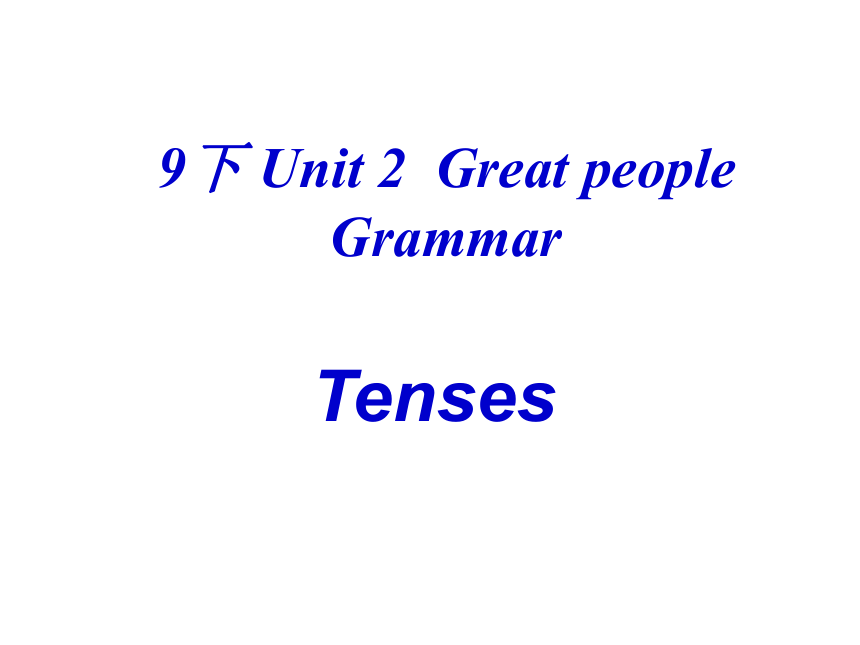
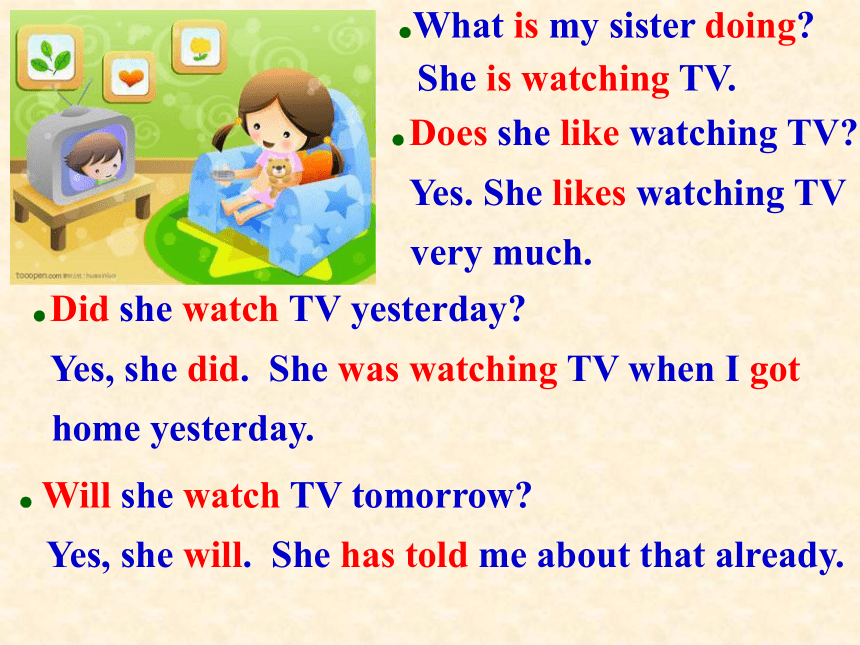
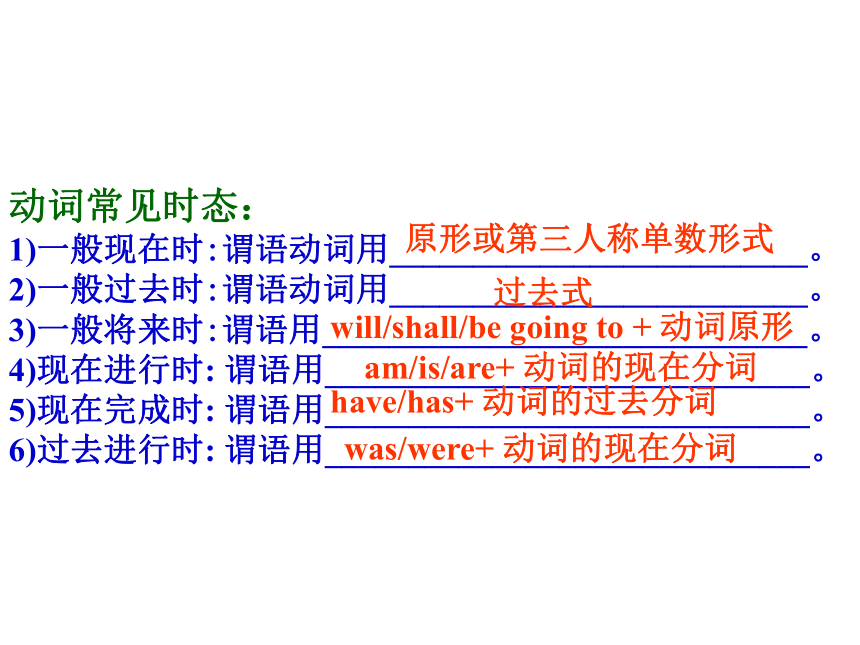
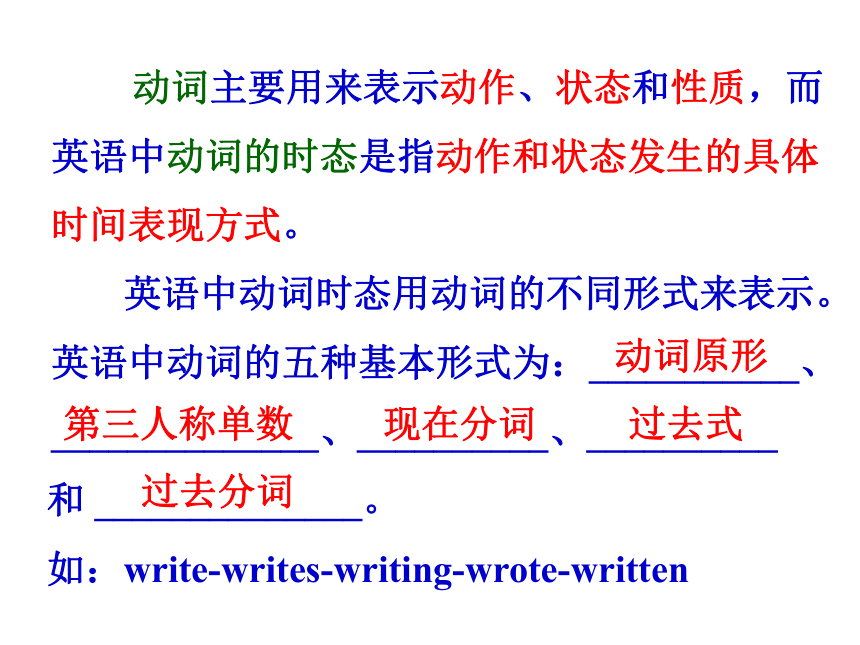
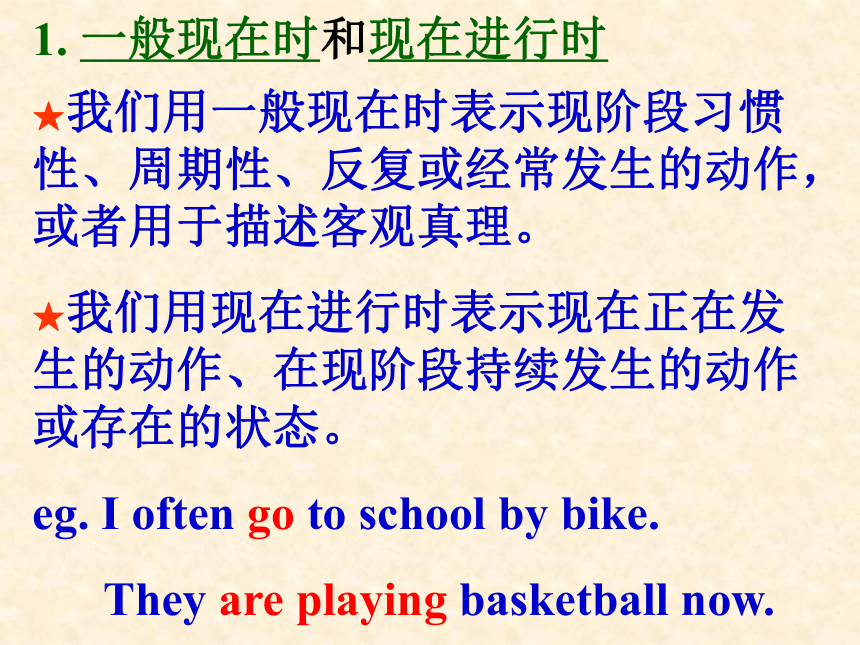
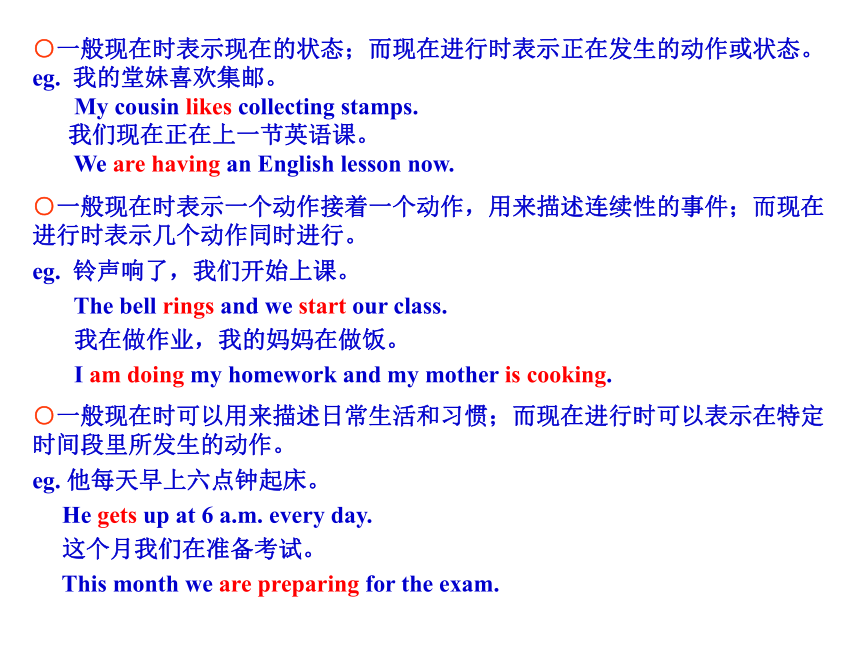
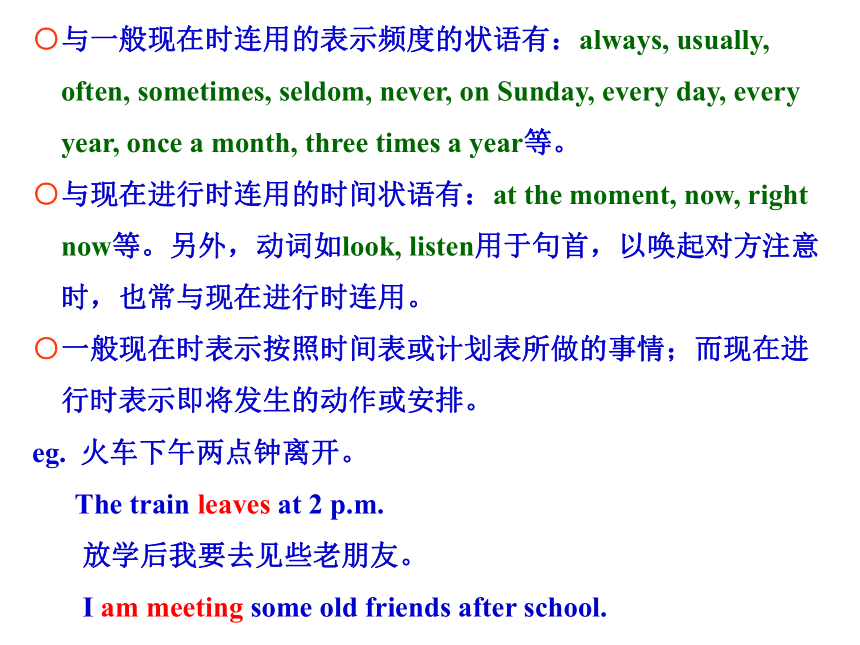
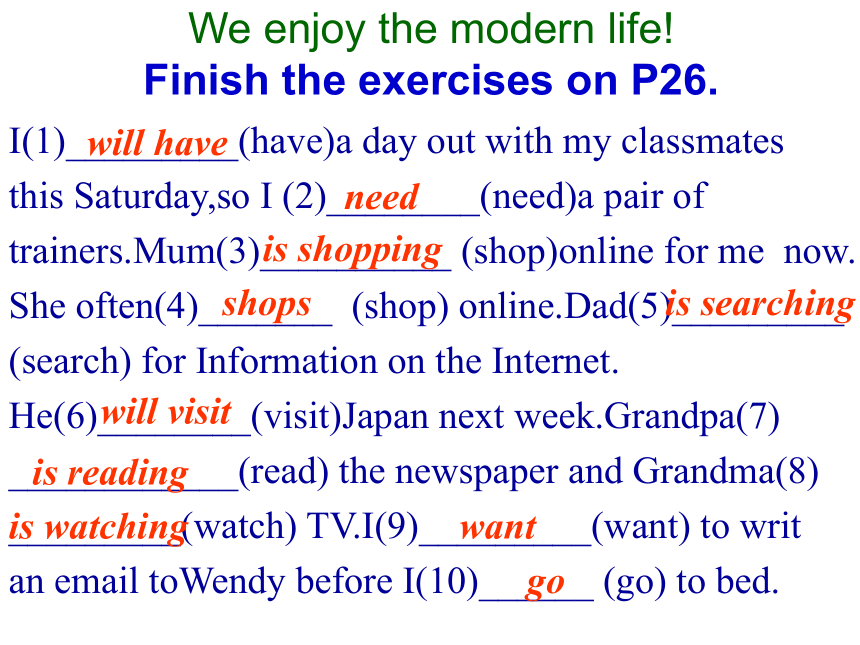
文档简介
课件24张PPT。Unit 2 Great people Tenses9下 Unit 2 Great people
Grammar●What is my sister doing?
She is watching TV.● Does she like watching TV?
Yes. She likes watching TV
very much.● Did she watch TV yesterday?
Yes, she did. She was watching TV when I got
home yesterday.● Will she watch TV tomorrow?
Yes, she will. She has told me about that already.动词常见时态:
1)一般现在时:谓语动词用_________________________。
2)一般过去时:谓语动词用_________________________。
3)一般将来时:谓语用_____________________________。
4)现在进行时: 谓语用_____________________________。
5)现在完成时: 谓语用_____________________________。
6)过去进行时: 谓语用_____________________________。原形或第三人称单数形式过去式will/shall/be going to + 动词原形am/is/are+ 动词的现在分词have/has+ 动词的过去分词was/were+ 动词的现在分词 动词主要用来表示动作、状态和性质,而英语中动词的时态是指动作和状态发生的具体时间表现方式。
英语中动词时态用动词的不同形式来表示。英语中动词的五种基本形式为:___________、______________、__________、__________
和 ______________。
如:write-writes-writing-wrote-written动词原形第三人称单数现在分词过去式过去分词1. 一般现在时和现在进行时★我们用一般现在时表示现阶段习惯性、周期性、反复或经常发生的动作,或者用于描述客观真理。
★我们用现在进行时表示现在正在发生的动作、在现阶段持续发生的动作或存在的状态。
eg. I often go to school by bike.
They are playing basketball now.○一般现在时表示现在的状态;而现在进行时表示正在发生的动作或状态。
eg. 我的堂妹喜欢集邮。
My cousin likes collecting stamps.
我们现在正在上一节英语课。
We are having an English lesson now.
○一般现在时表示一个动作接着一个动作,用来描述连续性的事件;而现在进行时表示几个动作同时进行。
eg. 铃声响了,我们开始上课。
The bell rings and we start our class.
我在做作业,我的妈妈在做饭。
I am doing my homework and my mother is cooking.
○一般现在时可以用来描述日常生活和习惯;而现在进行时可以表示在特定时间段里所发生的动作。
eg. 他每天早上六点钟起床。
He gets up at 6 a.m. every day.
这个月我们在准备考试。
This month we are preparing for the exam. ○与一般现在时连用的表示频度的状语有:always, usually,
often, sometimes, seldom, never, on Sunday, every day, every
year, once a month, three times a year等。
○与现在进行时连用的时间状语有:at the moment, now, right
now等。另外,动词如look, listen用于句首,以唤起对方注意
时,也常与现在进行时连用。
○一般现在时表示按照时间表或计划表所做的事情;而现在进
行时表示即将发生的动作或安排。
eg. 火车下午两点钟离开。
The train leaves at 2 p.m.
放学后我要去见些老朋友。
I am meeting some old friends after school.We enjoy the modern life! Finish the exercises on P26.I(1)_________(have)a day out with my classmates
this Saturday,so I (2)________(need)a pair of
trainers.Mum(3)__________ (shop)online for me now.
She often(4)_______ (shop) online.Dad(5)_________
(search) for Information on the Internet.
He(6)________(visit)Japan next week.Grandpa(7)
____________(read) the newspaper and Grandma(8)
_________(watch) TV.I(9)_________(want) to writ
an email toWendy before I(10)______ (go) to bed.
will haveis shoppingneedshopsis searchingwill visitis readingis watchingwantgo2. 一般过去时和过去进行时★我们用一般过去时表示在过去发生的动作或存在的状态。
★我们用过去进行时表示过去的某个时刻正在发生的动作、过去同一时间里同时发生的动作或在过去的某个时间段内持续发生的动作或存在的状态。
eg. They moved to Shanghai last week.
We were watching TV from 7 p.m. to 9 p.m.
last night.○一般过去时表示过去发生的动作或者存在的状态;过去进行时强调过去某个时刻发生的动作。
eg. 昨天他丢失了自行车。
He lost his bike yesterday.
昨天下午2点时我正在看一本小说。
I was reading a novel at 2 p.m. yesterday.
○一般过去时可以表示过去发生的一系列连续的动作;而过去进行时表示过去同一时间里同时发生的动作。
eg. 他吃完晚饭,然后做作业。
He had dinner and then did his homework.
当她的妈妈在打电话的时候,她在画画。
She was drawing while her mother was talking on the phone.
○过去进行时还可以表示过去的某个时间段内持续发生的动作或存在的状态。
eg. 前天整个下午他们都在放风筝。
They were flying kites the whole afternoon the day before yesterday.
○与一般过去时连用的时间状语有:yesterday, the day before yesterday, last year, two months ago等。
○与过去进行时连用的时间状语有:at this time yesterday, from…to…, last night等。
○过去进行时通常用while, when连接。
eg. 当他爸爸回来的时候,他在睡觉。
He was sleeping when his father came back.
当他的妈妈在看电视的时候,他在听音乐。
While his mother was watching TV, he was listening to music.
○过去进行时也可用来表示过去按计划即将发生的动作。
eg. 我在去体育中心的路上。我将在那里上一节游泳课。
I was on my way to the sports centre. I was having a
swimming lesson there.
○过去进行时常与always等频度副词连用,表示过去频繁发生的习惯性动作,此时的过去进行时常带有一定的感彩。
eg. He was always playing computer games when he was in Grade 7.What did you do last night? Finish the exercises on P27.Simon:I (1)_________ (watch)a wonderful football match from 7p.m. to 8:30p.m.
yesterday.My favourite team(2)___ _ (win) the match.
Millie:I (3)__________ (write) an email to Wendy at
7p.m.yesterday.She(4)____ (send)me an email last week.
Sandy:I (5)___________ (practise) playing the piano th whole night. I (6)______ (take) part in the competion this morning.
Peter:Last night,I (7)________(find) a websitw about
travelling in space.I(8)_____________(read)was watchingwonwas writingsentwas practisingtookfoundwas readingWhat did you do last night? Finish the exercises on P27. passage on the website while you(9)
____________(play)the piano ,Sandy.
Daniel:I (10)___________(talk) to Aunt Jane
on the phone at 7:30 yesterday evening.
She(11)______ (call) me the day before
yesterday, but I (12)________(be not)
at home then.was playingwas playingcalledwasn’t2. 一般过去时和现在完成时★我们用一般过去时表示在过去发生的动作或存在的状态。
★我们用现在完成时描述一个发生在过去,并一直延续到现在,或者可能还要延续到将来的动作。
eg. He came to Nanjing in 1990.
He has lived in Nanjing for twenty-four
years.○一般过去时表示过去发生的动作或者存在的状态;现在完成时强调过去动作所产生的结果或影响。
eg. 他很晚才回家。
He came back home late.
他已经买了两辆车。
He has already bought two cars.
○一般过去时表示过去某个时间点发生的动作;而现在完成时表示过去某个动作直到现在已经发生了多少次。
eg. 他两年前来过这里。
He came here two years ago.
他已经来过这里很多次了。
He has come here many times.
○几个副词在现在完成时中的用法:just意为“刚刚”,表示动作刚刚结束,常放在助动词与过去分词之间;ever意为“曾经”,用于疑问句或否定句中,多放在助动词和过去分词之间;never意为“从来没有”,常与before连用,多放在助动词与过去分词之间;before意为“以前”,指过去不确定的某个时候,总是放在句末,不受句型的限制。
○ since与表示时间点的时间状语连用;for与表示时间段的时间状语连用。
eg. 我来这里已经有两周了。
It has been two weeks since I came here.
我来这里已经有两周了。
I have been here for two weeks.○现在完成时中注意延续性动词和非延续性动词的区别。
○现在完成时不可以与yesterday, last week, two
days ago等表示过去的时间状语连用(since…除外)。Great inventions Finish the exercises on P28.Many modern inventions(1)_____________(make)
a great difference in our life.They(2)___________
(change)the way we live.
In ancient times,people(3)_________(use)salt to
Help them keep fish or meat for a longer time.
Fresh food would go bad in summer in a few hours.
The invention of the fridge (4)____________(solve)
This problem.have madehave changedusedhave solvedGreat inventions Finish the exercises on P28.In the past, people(5)_________(wash) their
clothes by hand. It (6)_________(be) tiring,
and it (7)_________(take) a lot of time.With
the invention of the washing machine,people
(8)____________(have)more time to relax.
In the old days,people(9)_______________(travel)
by ship.Now planes(10)____________(make)
Journey more comfortable.washedwastookhave hadhave travelledhave made用所给动词的适当形式填空:----_______(be) you busy yesterday?
----Yes. I _____________(prepare) for the
exam when you ________(call) me.
2. ----Where is your sister?
----She __________(make) a kite in the study.
3. The young woman told her son that the sun ________(rise) in the east.
----_____ you _________(hand) in your homework yet?
----Yes. I ________(hand) it in just now.
5. Jack _________(be) to Canada many times.
He _______(go) there with his brother next week.Werewas preparingcalledis makingrisesHavehandedhandedhas beenis goingHomework
1.Review the six kinds of tense.
2.Finish off some exercises.
3.Preview “Integrated skills”.Thank you!
Grammar●What is my sister doing?
She is watching TV.● Does she like watching TV?
Yes. She likes watching TV
very much.● Did she watch TV yesterday?
Yes, she did. She was watching TV when I got
home yesterday.● Will she watch TV tomorrow?
Yes, she will. She has told me about that already.动词常见时态:
1)一般现在时:谓语动词用_________________________。
2)一般过去时:谓语动词用_________________________。
3)一般将来时:谓语用_____________________________。
4)现在进行时: 谓语用_____________________________。
5)现在完成时: 谓语用_____________________________。
6)过去进行时: 谓语用_____________________________。原形或第三人称单数形式过去式will/shall/be going to + 动词原形am/is/are+ 动词的现在分词have/has+ 动词的过去分词was/were+ 动词的现在分词 动词主要用来表示动作、状态和性质,而英语中动词的时态是指动作和状态发生的具体时间表现方式。
英语中动词时态用动词的不同形式来表示。英语中动词的五种基本形式为:___________、______________、__________、__________
和 ______________。
如:write-writes-writing-wrote-written动词原形第三人称单数现在分词过去式过去分词1. 一般现在时和现在进行时★我们用一般现在时表示现阶段习惯性、周期性、反复或经常发生的动作,或者用于描述客观真理。
★我们用现在进行时表示现在正在发生的动作、在现阶段持续发生的动作或存在的状态。
eg. I often go to school by bike.
They are playing basketball now.○一般现在时表示现在的状态;而现在进行时表示正在发生的动作或状态。
eg. 我的堂妹喜欢集邮。
My cousin likes collecting stamps.
我们现在正在上一节英语课。
We are having an English lesson now.
○一般现在时表示一个动作接着一个动作,用来描述连续性的事件;而现在进行时表示几个动作同时进行。
eg. 铃声响了,我们开始上课。
The bell rings and we start our class.
我在做作业,我的妈妈在做饭。
I am doing my homework and my mother is cooking.
○一般现在时可以用来描述日常生活和习惯;而现在进行时可以表示在特定时间段里所发生的动作。
eg. 他每天早上六点钟起床。
He gets up at 6 a.m. every day.
这个月我们在准备考试。
This month we are preparing for the exam. ○与一般现在时连用的表示频度的状语有:always, usually,
often, sometimes, seldom, never, on Sunday, every day, every
year, once a month, three times a year等。
○与现在进行时连用的时间状语有:at the moment, now, right
now等。另外,动词如look, listen用于句首,以唤起对方注意
时,也常与现在进行时连用。
○一般现在时表示按照时间表或计划表所做的事情;而现在进
行时表示即将发生的动作或安排。
eg. 火车下午两点钟离开。
The train leaves at 2 p.m.
放学后我要去见些老朋友。
I am meeting some old friends after school.We enjoy the modern life! Finish the exercises on P26.I(1)_________(have)a day out with my classmates
this Saturday,so I (2)________(need)a pair of
trainers.Mum(3)__________ (shop)online for me now.
She often(4)_______ (shop) online.Dad(5)_________
(search) for Information on the Internet.
He(6)________(visit)Japan next week.Grandpa(7)
____________(read) the newspaper and Grandma(8)
_________(watch) TV.I(9)_________(want) to writ
an email toWendy before I(10)______ (go) to bed.
will haveis shoppingneedshopsis searchingwill visitis readingis watchingwantgo2. 一般过去时和过去进行时★我们用一般过去时表示在过去发生的动作或存在的状态。
★我们用过去进行时表示过去的某个时刻正在发生的动作、过去同一时间里同时发生的动作或在过去的某个时间段内持续发生的动作或存在的状态。
eg. They moved to Shanghai last week.
We were watching TV from 7 p.m. to 9 p.m.
last night.○一般过去时表示过去发生的动作或者存在的状态;过去进行时强调过去某个时刻发生的动作。
eg. 昨天他丢失了自行车。
He lost his bike yesterday.
昨天下午2点时我正在看一本小说。
I was reading a novel at 2 p.m. yesterday.
○一般过去时可以表示过去发生的一系列连续的动作;而过去进行时表示过去同一时间里同时发生的动作。
eg. 他吃完晚饭,然后做作业。
He had dinner and then did his homework.
当她的妈妈在打电话的时候,她在画画。
She was drawing while her mother was talking on the phone.
○过去进行时还可以表示过去的某个时间段内持续发生的动作或存在的状态。
eg. 前天整个下午他们都在放风筝。
They were flying kites the whole afternoon the day before yesterday.
○与一般过去时连用的时间状语有:yesterday, the day before yesterday, last year, two months ago等。
○与过去进行时连用的时间状语有:at this time yesterday, from…to…, last night等。
○过去进行时通常用while, when连接。
eg. 当他爸爸回来的时候,他在睡觉。
He was sleeping when his father came back.
当他的妈妈在看电视的时候,他在听音乐。
While his mother was watching TV, he was listening to music.
○过去进行时也可用来表示过去按计划即将发生的动作。
eg. 我在去体育中心的路上。我将在那里上一节游泳课。
I was on my way to the sports centre. I was having a
swimming lesson there.
○过去进行时常与always等频度副词连用,表示过去频繁发生的习惯性动作,此时的过去进行时常带有一定的感彩。
eg. He was always playing computer games when he was in Grade 7.What did you do last night? Finish the exercises on P27.Simon:I (1)_________ (watch)a wonderful football match from 7p.m. to 8:30p.m.
yesterday.My favourite team(2)___ _ (win) the match.
Millie:I (3)__________ (write) an email to Wendy at
7p.m.yesterday.She(4)____ (send)me an email last week.
Sandy:I (5)___________ (practise) playing the piano th whole night. I (6)______ (take) part in the competion this morning.
Peter:Last night,I (7)________(find) a websitw about
travelling in space.I(8)_____________(read)was watchingwonwas writingsentwas practisingtookfoundwas readingWhat did you do last night? Finish the exercises on P27. passage on the website while you(9)
____________(play)the piano ,Sandy.
Daniel:I (10)___________(talk) to Aunt Jane
on the phone at 7:30 yesterday evening.
She(11)______ (call) me the day before
yesterday, but I (12)________(be not)
at home then.was playingwas playingcalledwasn’t2. 一般过去时和现在完成时★我们用一般过去时表示在过去发生的动作或存在的状态。
★我们用现在完成时描述一个发生在过去,并一直延续到现在,或者可能还要延续到将来的动作。
eg. He came to Nanjing in 1990.
He has lived in Nanjing for twenty-four
years.○一般过去时表示过去发生的动作或者存在的状态;现在完成时强调过去动作所产生的结果或影响。
eg. 他很晚才回家。
He came back home late.
他已经买了两辆车。
He has already bought two cars.
○一般过去时表示过去某个时间点发生的动作;而现在完成时表示过去某个动作直到现在已经发生了多少次。
eg. 他两年前来过这里。
He came here two years ago.
他已经来过这里很多次了。
He has come here many times.
○几个副词在现在完成时中的用法:just意为“刚刚”,表示动作刚刚结束,常放在助动词与过去分词之间;ever意为“曾经”,用于疑问句或否定句中,多放在助动词和过去分词之间;never意为“从来没有”,常与before连用,多放在助动词与过去分词之间;before意为“以前”,指过去不确定的某个时候,总是放在句末,不受句型的限制。
○ since与表示时间点的时间状语连用;for与表示时间段的时间状语连用。
eg. 我来这里已经有两周了。
It has been two weeks since I came here.
我来这里已经有两周了。
I have been here for two weeks.○现在完成时中注意延续性动词和非延续性动词的区别。
○现在完成时不可以与yesterday, last week, two
days ago等表示过去的时间状语连用(since…除外)。Great inventions Finish the exercises on P28.Many modern inventions(1)_____________(make)
a great difference in our life.They(2)___________
(change)the way we live.
In ancient times,people(3)_________(use)salt to
Help them keep fish or meat for a longer time.
Fresh food would go bad in summer in a few hours.
The invention of the fridge (4)____________(solve)
This problem.have madehave changedusedhave solvedGreat inventions Finish the exercises on P28.In the past, people(5)_________(wash) their
clothes by hand. It (6)_________(be) tiring,
and it (7)_________(take) a lot of time.With
the invention of the washing machine,people
(8)____________(have)more time to relax.
In the old days,people(9)_______________(travel)
by ship.Now planes(10)____________(make)
Journey more comfortable.washedwastookhave hadhave travelledhave made用所给动词的适当形式填空:----_______(be) you busy yesterday?
----Yes. I _____________(prepare) for the
exam when you ________(call) me.
2. ----Where is your sister?
----She __________(make) a kite in the study.
3. The young woman told her son that the sun ________(rise) in the east.
----_____ you _________(hand) in your homework yet?
----Yes. I ________(hand) it in just now.
5. Jack _________(be) to Canada many times.
He _______(go) there with his brother next week.Werewas preparingcalledis makingrisesHavehandedhandedhas beenis goingHomework
1.Review the six kinds of tense.
2.Finish off some exercises.
3.Preview “Integrated skills”.Thank you!
